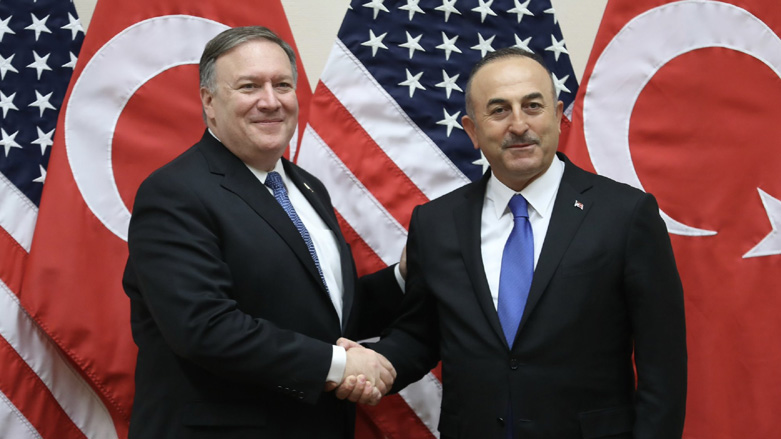Pompeo, Cavusoglu speak again, as Erdogan reasserts tough line

WASHINGTON DC (Kurdistan 24) – In an apparent effort to mend strained ties, US Secretary of State Mike Pompeo and Turkish Foreign Minister Mevlut Cavusoglu spoke by phone on Saturday for the second time in three days.
However, Turkish President Recep Tayyip Erdogan was reported by Turkish media, early on Sunday, articulating a tough line against the US, as he accused Washington of engaging in “psychological warfare.”
Turkey’s detention of the American evangelical pastor Andrew Brunson in October 2016, on what US officials have repeatedly denounced as trumped-up charges, lies at the center of current tensions between Washington and Ankara.
A Turkish court on Wednesday ordered that Brunson be released from prison to house arrest, where he is to be monitored electronically.
The Trump administration, however, was not satisfied with the Turkish move.
Pompeo spoke with Cavusoglu by phone that day and “underscored that it was well past time for this innocent Pastor, Andrew Brunson, to come home,” according to the State Department’s brief (two sentences) read-out of their conversation.
US President Donald Trump believed that he had reached a deal with Turkish President Recep Tayyip Erdogan at the NATO summit in Brussels two weeks earlier, as The Washington Post reported.
Trump was to persuade Israeli Prime Minister Benjamin Netanyahu to release a 27-year-old Turkish woman, whom Israel had detained on charges of smuggling for the Palestinian terrorist organization, Hamas. Erdogan was to release Brunson.
The Turkish woman, Ebru Ozkan, was, indeed, released and deported back to Turkey, but Brunson has not been freed and still faces trial in October.
On Thursday morning, Trump had a “rancorous” phone call with Erdogan, the Post revealed.
Later that day at the State Department’s Ministerial conference to Advance Religious Freedom, Vice-President Mike Pence addressed “a message on behalf of the President of the United States of America” to “President Erdogan and the Turkish government.”
“If Turkey does not take immediate action to free this innocent man of faith,” Pence said, “and send him home to America, the United States will impose significant sanctions on Turkey.”
Subsequently, Trump tweeted, “The United States will impose large sanctions on Turkey for their longtime detainment of Pastor Andrew Brunson, a great Christian, family man, and wonderful human being.”
Erdogan’s spokesman, Ibrahim Kalin, responded by saying that the administration’s “threatening language” was “unacceptable.”
Cavusoglu tweeted, “No one dictates to Turkey,” adding “We will never tolerate threats from anybody.”
Saturday’s phone call with Pompeo suggested that the two officials were seeking to repair relations, but Erdogan later made clear that he is not, at least not at this time.
In his remarks to the Turkish media, Erdogan confirmed that the US had, indeed, assisted in securing Ozkan’s release. But he denied that there had been any understanding that Brunson would be freed.
“The friendship between the United States and Turkey is on the line in this dispute,” Erdogan warned.
“We will not take a step back when faced with sanctions,” he told the Turkish media. “They should not forget that they will lose a sincere partner.”
Many Americans would question that. The editors of The Washington Post, while not disputing the importance of securing Brunson’s release, wrote on Saturday that his detention was only one “part of a broader human rights disaster unfolding in Turkey” and called on the Trump administration to address that as well.
Given Trump’s transactional approach to international politics, it is unlikely that he would have asked Netanyahu to free someone, particularly someone charged with aiding a terrorist organization, without getting something in return.
Editing by Nadia Riva
